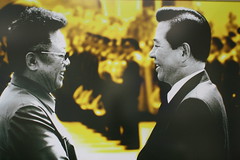ASIA
26 March 2014
KIM Dae-jung, a tribute
This is a tribute that I wrote on Korea’s Nobel-prize winning former President, Kim Dae-jung: born 3 December 1925, died 18 August 2009.
Korea's joining the OECD in 1996 was an important milestone in the globalization of the organization. It remains the only Asian country to have joined the OECD since Japan in 1964. Its membership was also an important recognition of the exceptional economic, social and political progress Korea had made in previous decades, rising from the ashes of war to become a world economic power and full-fledged democracy.
There were very few people who contributed more to Korea's success than former President Kim Dae-jung, who died in August. He struggled valiantly for democracy and human rights and his dream of national unification of North and South Korea. As Kim Dae-jung said in receiving the Nobel Peace Prize in 2000, "five times I faced near death at the hands of dictators, six years I spent in prison, and forty years I lived under house arrest or in exile and under constant surveillance". To date, he is the only Korean to have won a Nobel prize.
After several attempts, Kim Dae-jung was elected president of his country in December 1997. It was the first transition of power from the ruling to the opposition party in Korea's modern history. At the time Korea was mired in financial crisis. Kim Dae-jung brilliantly saved his country from the brink of bankruptcy through crisis management, structural reforms and strengthening its democratic institutions.
Kim Dae-jung looked to the OECD for advice on the structural policies needed to put Korea back on a path of rapid economic development, and regularly invited then secretary-general of the OECD, Donald J. Johnston, to the Blue House for discussions. He thus launched a far-reaching program of structural reforms in the areas of corporate governance, financial market supervision, foreign direct investment, regulatory reform, combating corruption and privatization. After shrinking in 1998, the Korean economy bounced back in 1999 and resumed a path of rapid economic development. Although Kim Dae-jung will always be remembered as the "president of peace and democracy", he should be equally remembered as the president who saved his country from economic crisis.
After his presidential term, in 2003, I had the honor of visiting Kim Dae-jung at his private residence in Seoul in the company of Mr Johnston. I remember so well his peaceful aura and the peaceful atmosphere of his house with its beautiful collection of orchids. When Mr Johnston invited him to make a keynote address at OECD Forum 2004, Kim Dae-jung instantly accepted.
In his speech at the OECD Forum, he spoke of his dreams of Korean unification and his efforts to achieve it through his sunshine policy. It was a poignant reminder to the largely European-based audience that although the Cold War had come to an end on their continent, East Asia was still not living in peace.
Kim Dae-jung was a remarkable person from a remarkable country, and deserves to be remembered as one of the great architects of contemporary world history.
This article was originally published in the OECD Observer magazine, December 2009.
Executive Director
Asian Century Institute
www.asiancenturyinstitute.com
There were very few people who contributed more to Korea's success than former President Kim Dae-jung, who died in August. He struggled valiantly for democracy and human rights and his dream of national unification of North and South Korea. As Kim Dae-jung said in receiving the Nobel Peace Prize in 2000, "five times I faced near death at the hands of dictators, six years I spent in prison, and forty years I lived under house arrest or in exile and under constant surveillance". To date, he is the only Korean to have won a Nobel prize.
After several attempts, Kim Dae-jung was elected president of his country in December 1997. It was the first transition of power from the ruling to the opposition party in Korea's modern history. At the time Korea was mired in financial crisis. Kim Dae-jung brilliantly saved his country from the brink of bankruptcy through crisis management, structural reforms and strengthening its democratic institutions.
Kim Dae-jung looked to the OECD for advice on the structural policies needed to put Korea back on a path of rapid economic development, and regularly invited then secretary-general of the OECD, Donald J. Johnston, to the Blue House for discussions. He thus launched a far-reaching program of structural reforms in the areas of corporate governance, financial market supervision, foreign direct investment, regulatory reform, combating corruption and privatization. After shrinking in 1998, the Korean economy bounced back in 1999 and resumed a path of rapid economic development. Although Kim Dae-jung will always be remembered as the "president of peace and democracy", he should be equally remembered as the president who saved his country from economic crisis.
After his presidential term, in 2003, I had the honor of visiting Kim Dae-jung at his private residence in Seoul in the company of Mr Johnston. I remember so well his peaceful aura and the peaceful atmosphere of his house with its beautiful collection of orchids. When Mr Johnston invited him to make a keynote address at OECD Forum 2004, Kim Dae-jung instantly accepted.
In his speech at the OECD Forum, he spoke of his dreams of Korean unification and his efforts to achieve it through his sunshine policy. It was a poignant reminder to the largely European-based audience that although the Cold War had come to an end on their continent, East Asia was still not living in peace.
Kim Dae-jung was a remarkable person from a remarkable country, and deserves to be remembered as one of the great architects of contemporary world history.
This article was originally published in the OECD Observer magazine, December 2009.
Author
John WestExecutive Director
Asian Century Institute
www.asiancenturyinstitute.com




